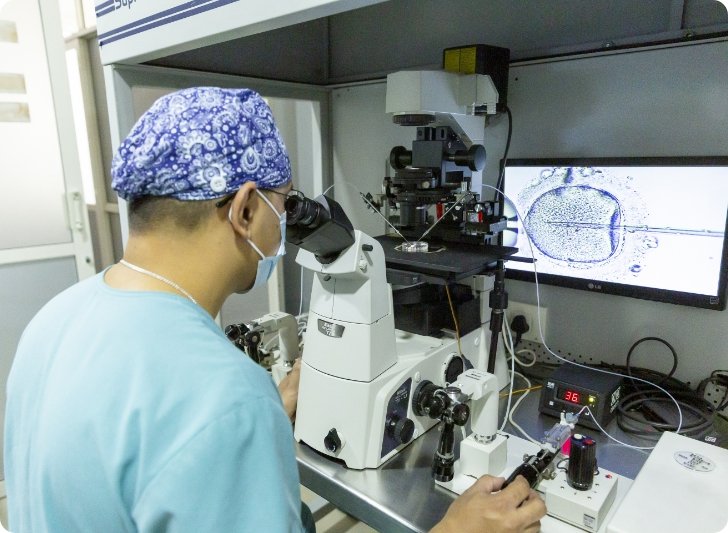IntraCytoplasmic Sperm Injection (ICSI)
- Services
Thorough Subfertility Couple Counseling
Comprehensive Subfertility Workup of Subfertile Couple
Transvaginal Sonography (TVS) of Subfertile Female
Sono Hystero Salpingo Graphy (SSG)
Timed Intercourse (TI)
Intra Uterine Insemination (IUI)
In-Vitro Fertilization and Embryo Transfer (IVF-ET) (Regular/Batch)
IntraCytoplasmic Sperm Injection (ICSI)
Cryopreservation of Sperm
Vitrification (Oocytes & Embryos)
Donor Programme
Andrology Services
Pathology Routine/ Hormone Estimation
Radiology
Fetal Echocardiography
Antenatal Clinic
Endocrinology
Any Questions About Fertility challenges
Call Anytime!
+977 9840187810

Introduction
What is ICSI?
Who Should Consider ICSI?
- Severe Sperm Problems: Patients with extremely low sperm count, poor motility, or abnormal sperm morphology, where natural or conventional IVF is unlikely to succeed.
- Previous IVF Failures: Couples who have undergone multiple IVF cycles without achieving successful fertilization, even when good-quality eggs were retrieved.
The ICSI Process
1. Initial Consultation
We thoroughly review the medical history of both partners, delving into past treatments, lifestyle factors, and any previous fertility issues. This comprehensive discussion helps us to gain a clear understanding of your individual circumstances and identify potential areas of concern.
1. Initial Consultation
Your ICSI journey begins with a detailed consultation where we review your medical history, conduct fertility assessments, and design a treatment plan tailored specifically to your fertility challenges. This is where we determine if ICSI is the best option for you.
2. Sperm Selection
In the ICSI process, a single healthy sperm is selected using advanced microscopic techniques. This ensures that the best sperm is used for fertilization, even in cases of severe male infertility.
3. Sperm Collection and Preparation
Sperm can be collected naturally or surgically, depending on the case. Once collected, the sperm undergoes a rigorous preparation process, ensuring that only the healthiest and most motile sperm are selected for injection.
4. Egg Retrieval
The egg retrieval process is performed under ultrasound guidance and involves collecting mature eggs from the ovaries. Light sedation is used to ensure comfort during the procedure.
- Preparation: Patients will receive instructions on how to prepare, which includes fasting for a few hours before the procedure and avoiding certain medications.
- During the Procedure: Egg retrieval takes around 10 t0 15 minutes and is minimally invasive. A fine needle is used to collect eggs, and patients typically resume normal activities within a day or two.
5. ICSI Procedure
Once the eggs are retrieved, the ICSI procedure begins. Using a fine micro-needle, the selected sperm is injected directly into the egg to promote fertilization. This method bypasses the need for the sperm to penetrate the egg naturally, offering a solution for severe male infertility.
6. Embryo Development
Once fertilization occurs, the embryos are carefully monitored in a controlled lab environment. Our embryologists track their growth, ensuring the healthiest embryos are selected for transfer.
7. Embryo Transfer
When the embryos are ready, they are transferred into the uterus to initiate pregnancy.
- Preparation: Before embryo transfer, patients will receive guidance on medication and lifestyle adjustments to ensure optimal conditions.
- During the Procedure: Embryo transfer is a painless, quick procedure that doesn’t require anesthesia. A thin catheter is used to place the embryos in the uterus, and patients can resume normal activities shortly after.
- After the Procedure: Following the procedure, we’ll monitor your progress and perform a pregnancy test within two weeks to determine the success of the treatment.
Benefits of ICSI
High Success Rates:
ICSI offers high success rates, particularly in cases of severe male infertility or previous IVF failures. The direct injection of sperm ensures fertilization even in the most challenging cases.
Advanced Technology:
We use the latest reproductive technologies and laboratory equipment to perform ICSI, enhancing the likelihood of a successful fertilization and healthy embryo development.
Suitability for Severe Cases:
ICSI is particularly beneficial for couples dealing with severe sperm abnormalities or multiple IVF failures. Its precision and control make it an ideal choice for those with more complex fertility challenges.
Factors Influencing Success
ICSI is proven to be highly effective, with success rates comparable to conventional IVF, particularly for couples dealing with severe male infertility or failed IVF attempts. While ICSI offers high success rates, several factors can influence the outcome, including the age of the patient, overall health, and the quality of sperm and eggs. Our team will work closely with you to optimize these factors.
Frequently Asked Questions
Is ICSI different from IVF?
What is the success rate of ICSI?
How many embryos are typically transferred during ICSI - ET??
The number of embryos transferred depends on several factors, including the patient’s age and embryo quality, but often 2 to 3 embryos are transferred to maximize the success.
